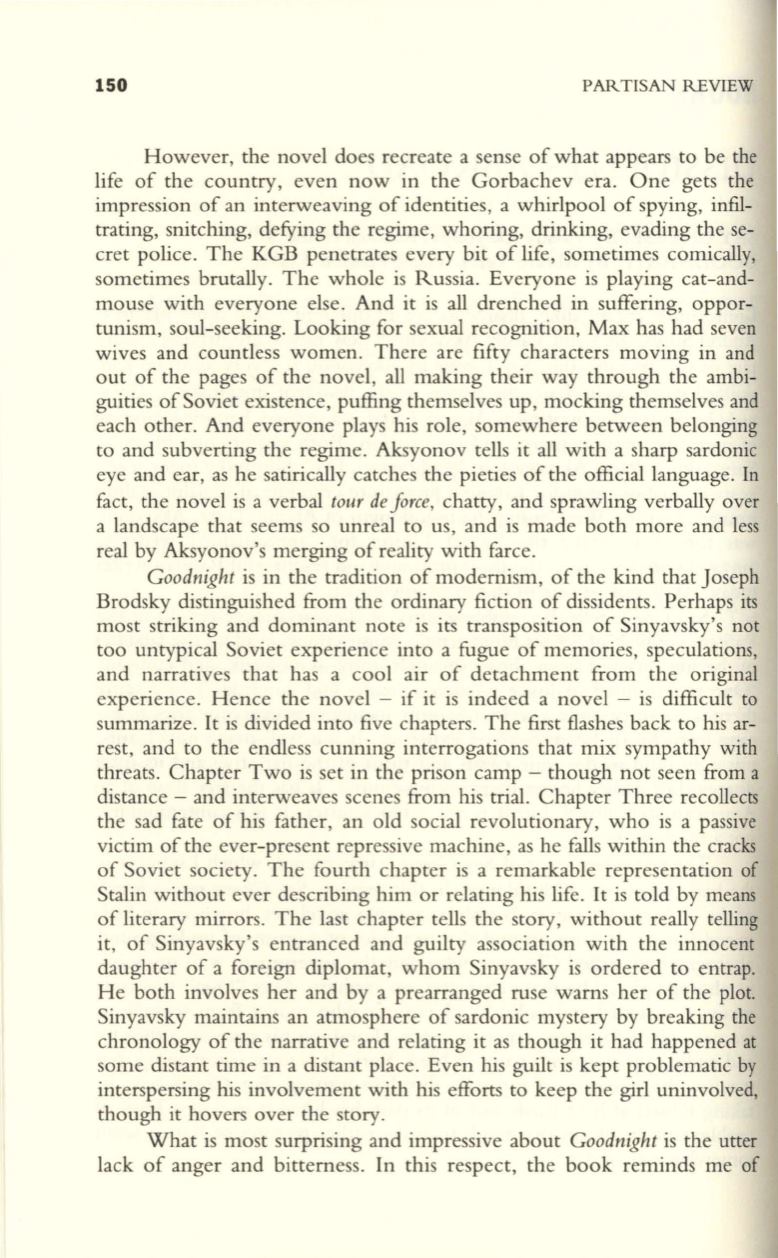
150
p
ARTISAN REVIEW
However, the novel does recreate a sense of what appears to be the
life of the country, even now in the Gorbachev era. One gets the
impression of an interweaving of identities, a whirlpool of spying, infil–
trating, snitching, defying the regime, whoring, drinking, evading the se–
cret police. The KGB penetrates every bit of life, sometimes comically,
sometimes brutally. The whole is Russia. Everyone is playing cat-and–
mouse with everyone else . And it is all drenched in suffering, oppor–
tunism, soul-seeking. Looking for sexual recognition, Max has had seven
wives and countless women. There are fifty characters moving in and
out of the pages of the novel, all making their way through the ambi–
guities of Soviet existence, puffing themselves up, mocking themselves and
each other. And everyone plays his role, somewhere between belonging
to and subverting the regime. Aksyonov tells it all with a sharp sardonic
eye and ear, as he satirically catches the pieties of the official language. In
fact, the novel is a verbal
tour de force,
chatty, and sprawling verbally over
a landscape that seems so unreal to us, and is made both more and less
real by Aksyonov's merging of reality with farce.
Goodnight
is in the tradition of modernism, of the kind that Joseph
Brodsky distinguished from the ordinary fiction of dissidents. Perhaps its
most striking and dominant note is its transposition of Sinyavsky's not
too untypical Soviet experience into a fugue of memories, speculations,
and narratives that has a cool air of detachment from the original
experience. Hence the novel - if it is indeed a novel - is difficult to
summarize. It is divided into five chapters. The first flashes back to his ar–
rest, and to the endless cunning interrogations that mix sympathy with
threats. Chapter Two is set in the prison camp - though not seen from a
distance - and interweaves scenes from his trial. Chapter Three recollects
the sad fate of his father, an old social revolutionary, who is a passive
victim of the ever-present repressive machine, as he falls within the cracks
of Soviet society. The fourth chapter is a remarkable representation of
Stalin without ever describing him or relating his life. It is told by means
of literary mirrors. The last chapter tells the story, without really telling
it, of Sinyavsky's entranced and guilty association with the innocent
daughter of a foreign diplomat, whom Sinyavsky is ordered to entrap.
He both involves her and by a prearranged ruse warns her of the plot.
Sinyavsky maintains an atmosphere of sardonic mystery by breaking the
chronology of the narrative and relating it as though it had happened at
some distant time in a distant place. Even his guilt is kept problematic by
interspersing his involvement with his efforts to keep the girl uninvolved,
though it hovers over the story.
What is most surprising and impressive about
Goodnight
is the utter
lack of anger and bitterness . In this respect, the book reminds me of


